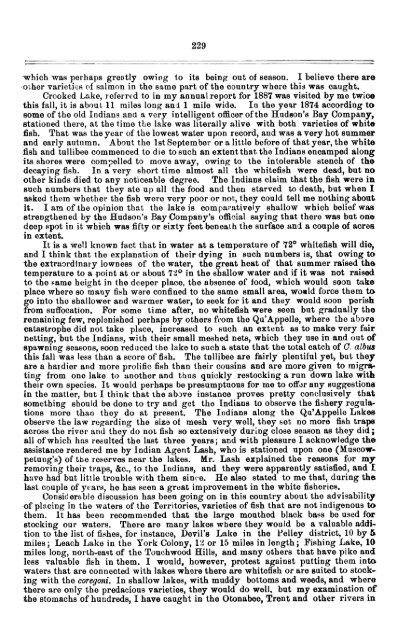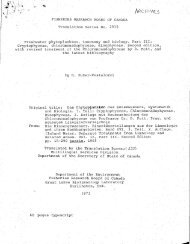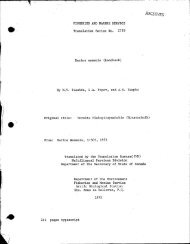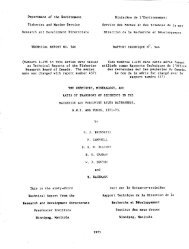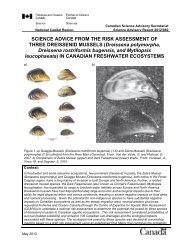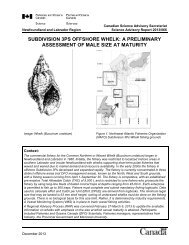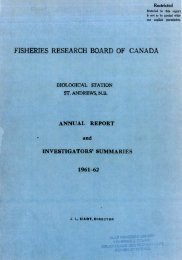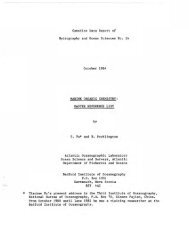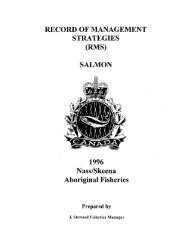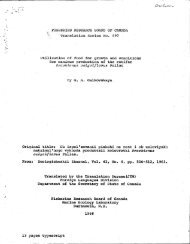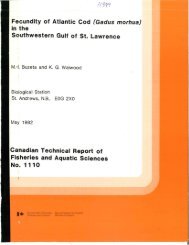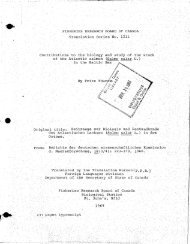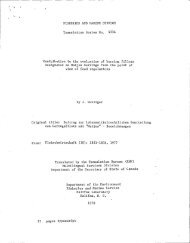Create successful ePaper yourself
Turn your PDF publications into a flip-book with our unique Google optimized e-Paper software.
229<br />
which was perhaps greitly owirg to its being out of seasonS I believe there are<br />
oLher varieties of salmon in the same part of the country where this was caught.<br />
Crooked Lake, referred to in my annual report for 1887 was visited by me twice<br />
this fall, it is about 11 miles long and 1 mile wide. In the year 1874 according to<br />
some of the old Indians anct a very intelligent officer of the Hudson's Bay Company,<br />
stationed there, at the time the lake was literally alive with both varieties of white<br />
fish. That was the year of the lowest water upon record, and was a very hot summer<br />
and early autumn. About the 1st September or a little before of that year, the white<br />
fish and tullibee commenced to die to such an extent that the Indians encamped along<br />
its shores were compelled to move away, owing to the intolerable stench of the<br />
decaying fish. In a very short time almost all the whitefish were dead, but no<br />
other kinds died to any noticeable degree. The Indians claim that the fish were in<br />
such numbers that they ate up all the food and then starved to death, but when I<br />
asked them whether the fish were very poor or not, they could tell me nothing abou1<br />
it. I am of the opinion that the lake is comparatively shallow which belief was<br />
strengthened by the Hudson's Bay Company's official saying that there was but one<br />
deep spot in it which was fifty or sixty feet beneath the surface and a couple of acres<br />
in extent.<br />
It is a well known fact that in water at a temperature of 72° whitefish will die,<br />
and I think that the explanation of their dying in such numbers is, that owing to<br />
the extraordinary lowness of the water, the great heat of that summer raised the<br />
temperature to a point at or about 72° in the sballow water and if it was not raised<br />
to the same height in the deeper place, the absence of food, which would soon take<br />
place where so many fish were confined to the same small area, would force them te<br />
go into the shallower and warmer water, to seek for it and they would soon perish<br />
from suffocation. For some time after, no whitefish were seen but gradually the<br />
remaining few, replenished perhaps by others from the Qu'Appelle, where the above<br />
catastrophe did not take place, increased to such an extent as to make very fair<br />
netting, 'but the Indians, with their small meshed nets, which they use in and out of<br />
spawning seasons, soon reduced the lake to such a state that the total catch of C. albus<br />
this fall was less than a score of fish. The tullibee are fairly plentiful yet, but they<br />
are a haidier and more prolific fish than their cousins and are more given to migra..<br />
ting from one lake to another and thus quickly restocking a run down lake with<br />
their own species. It would perhaps be presumptuous for me to offor any suggestions<br />
in the matter, but I think that the above instance proves pretty conclusively that<br />
something should be done to try and get the Indians to observe the fishery regula.<br />
tions more than they do at present. The Indians along the Qu'Appelle LakeB<br />
observe the law regarding the size of mesh very well, they set no more fish traps<br />
across the river and they do not fish so extensively during close season as they did;<br />
all of which has resulted the last three years; and with pleasure I acknowledge the<br />
assistance rendered me by Indian Agent Lash, who is stationed upon one (Muscowpetung's)<br />
of the reserves near the lakes. Mr. Lash explained the reasons for my<br />
removing their traps, &c., to the Indians, and they were apparently satisfied, and I<br />
have had but little trouble with them sifl(o. He also stated to me that, during the<br />
last couple of years, he has seen a great improvement in the white fisheries.<br />
Considerable discussion has been going on in this country about the advisability<br />
of placing in the waters of the Territories, varieties of fish that are not indigenous to<br />
them. It has been recommended that the large mouthed black bass be used for<br />
stocking our waters. There are many lakes where they would be a valuable addition<br />
to the list of fishes, for instance, Devil's Lake in the Pelley district, 10 by f<br />
miles; Leach Lake in the York Colony, 12 or 15 miles in length; Fishing Lake, 1G<br />
miles long, north-east of the Touchwood Hills, and many others that have pike and<br />
less valuable fish in them. I would, however, protest against putting them into<br />
waters that are connected with lakes where there are whitefish or are suited to stock—<br />
ing with the coregoni. In shallow lakes, with muddy bottoms and weeds, and where<br />
there are only the predacious varieties, they would do well, but my examination of<br />
the stomachs of hundreds, I have caught in the Otonabee, Trent and other rivers in


